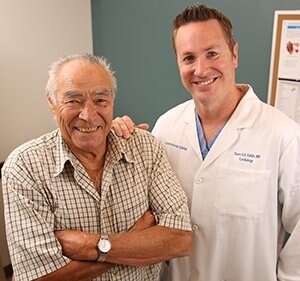Harry Fank

Harry Fank with CentraCare Heart &
Vascular Center cardiologist Thom Dahle, MD.
If you’re looking for Harry Fank, you’ll probably find him tending to his garden or riding one of his 12 tractors. Harry is a 77-year-old retired mechanic who likes to stay active on his one-acre plot 10 miles north of Hector, Minn. “I tend to stay busy, whether it’s up and down on ladders or buzzing around on my tractors,” said Harry.
But earlier this year, things started to slow down for Harry. He began experiencing dizzy spells and felt his heart “fluttering.” So he went to St. Cloud Hospital. Doctors told him he needed a transcatheter aortic valve replacement (TAVR), a new and advanced heart procedure performed at leading hospitals across the country.
TAVR is beneficial to patients because it’s a less invasive procedure — compared to open-heart surgery – that widens the aortic valve so blood can again flow freely from the heart. “TAVR was the right choice for Harry because he previously had open-heart surgery, which makes a repeat operation higher risk,” said cardiologist Thom Dahle, MD, CentraCare Heart & Vascular Center, who has treated hundreds of patients using this procedure.
With TAVR, a cardiologist threads a catheter containing a collapsible valve in a stent through the patient’s groin to the aortic valve. In Harry’s case, Dr. Dahle used an artery near his shoulder because Harry had a previous aortic aneurysm repaired, which prevented using an artery in his leg.
CentraCare Heart & Vascular Center is one of the top centers in the nation for this technique, which is called subclavian artery alternative access. As one of the largest programs in the state, it was chosen to start and run a nationwide multi-center trial evaluating outcomes of this approach.
The TAVR procedure typically takes less than an hour and patients often feel better immediately. “The recovery time with TAVR is significantly less compared to open-heart surgery,” said Dr. Dahle. “Most patients only receive minimal sedation to make them comfortable, so they’re alert and able to respond to questions during the procedure.”
Harry went home the day after his procedure and felt noticeably better right away. In fact, he no longer needs his blood pressure medication. With his new bill of health, Harry is happy to be able to get busy again.
Learn more about the CentraCare Heart & Vascular Center.